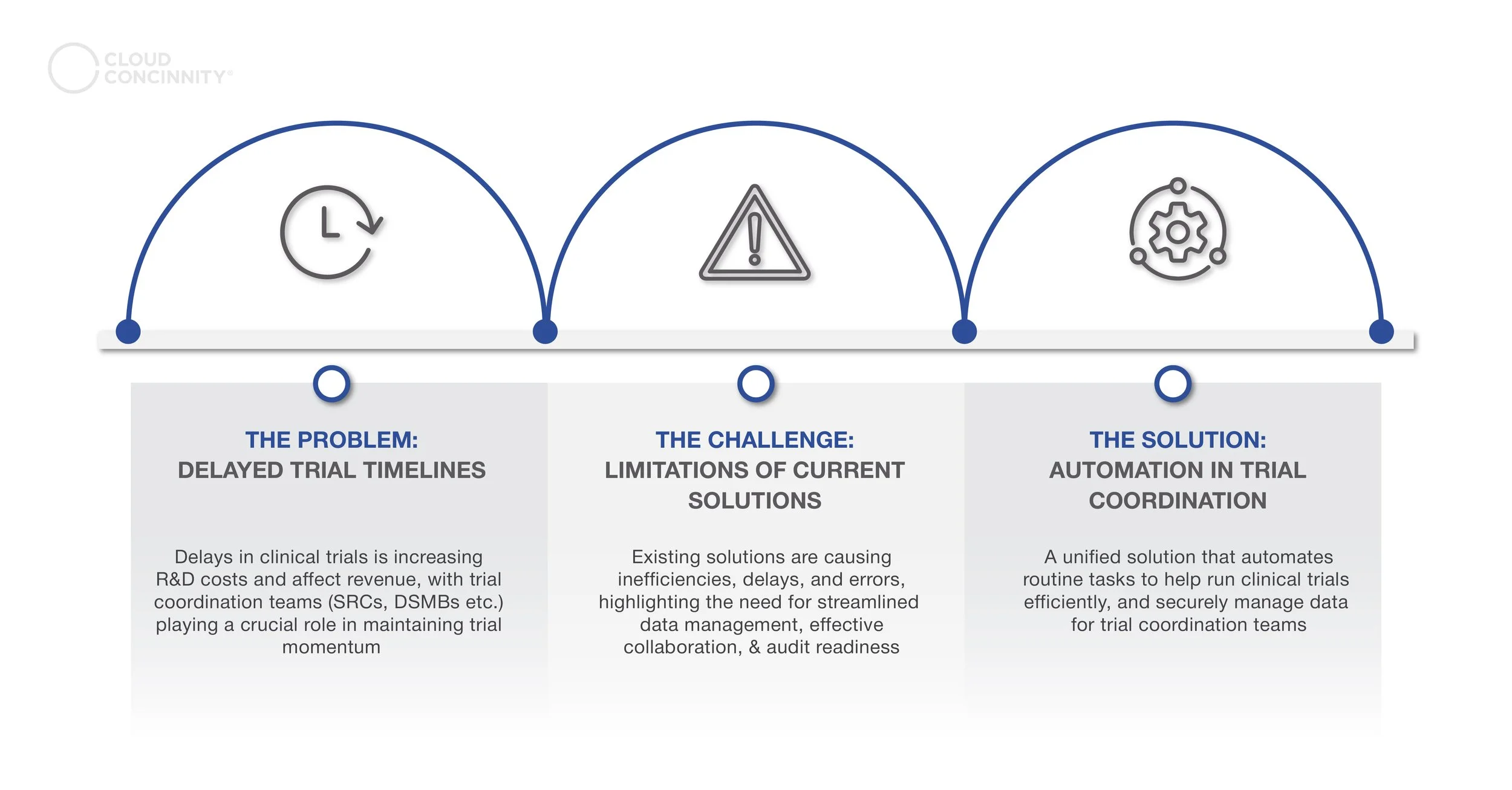Transforming Clinical Trials’ Coordination Through Automation
Clinical trial delays are a common challenge in drug research and development. Eight out of ten trials experience setbacks, with around 94% of these delays lasting longer than a month. This often results in increased costs, reduced profitability, or, in some cases, project failure. The root causes of these delays are frequently linked to unmet or complex regulatory compliance standards, gaps in procedure management, inefficient processes, and communication breakdowns between teams.
While it’s impossible to account for all unexpected challenges in today’s complex research environment, there are effective strategies to minimize the likelihood of clinical trial delays. One key approach is the integration of automation into clinical trial management.
Clinical Trial Coordination Committees play a vital role in ensuring patient safety and the scientific validity of trials. However, the current trial coordination landscape is complex, involving numerous stakeholders, intricate processes, and large volumes of data, all of which can negatively impact efficiency and contribute to delays.
Transforming Clinical Trials’ Coordination Through Automation - Problem , Challenge and Solution
The rise of automation technologies is reshaping clinical trial coordination. Traditional trial processes, which involve complex workflows managed by multiple teams, often lead to inefficiencies, delays, and errors. Automation simplifies these workflows by reducing repetitive tasks and centralizing operations, making trial management smoother and more streamlined. This shift not only enhances data quality but also helps detect unexpected variability that could affect trial outcomes. As a result, automation optimizes resource use, accelerates time-to-market, and alleviates staff workloads, ultimately making the clinical trial process more efficient and reliable. Many of the daily challenges faced by teams, such as independent safety review committees, can be alleviated with an automated solution. Here are the top five challenges experienced by clinical trial coordination committees:
1. Centralized Data Management: Clinical Trial Coordination Committees must carefully manage both blinded and unblinded data to avoid mistakes. Managing multiple committees across different trials, and accessing safety data without a unified platform increases the risk of data leaks and compliance issues, which can lead to inefficiencies and delays. Centralization of this process will help streamline both data management and trial coordination.
2. Document Management and Collaboration: Producing, sharing, and storing standardized documents like charters, agendas, and minutes can be challenging. Without a centralized system, documents become scattered, causing inconsistencies, while relying on emails or traditional repositories makes collaboration cumbersome and time-consuming.
3. Audit Readiness and Compliance: Achieving audit readiness and maintaining compliance requires detailed documentation and frequent updates. Regulatory teams must adhere to specific FDA and Charter requirements for each study. Clear eTMF documentation of Safety Listings, Document Distribution, and documented decision-making (eg. recommendation letters), is also essential to ensure all processes are accurately recorded and readily accessible for audits, a task that is challenging without the right platform.
4. Communication and Task Management: Organizing Trial Coordination Committees’ meetings across time zones is challenging and time-consuming without centralized scheduling tools, leading to delays and poor communication. Coordinating with statisticians for reports and sharing committees’ decisions throughout a trial requires strict procedures, and without the right tools, there's a real risk of things getting off track.
Addressing these challenges requires a decisive move toward automation. Automating routine tasks helps committees manage information more securely and run trials more efficiently. Cloud Concinnity has identified three key areas where automation can enhance the efficiency of clinical trial coordination:
1. Centralization: Cloud Concinnity’s Global Dashboard consolidates all projects into one hub, eliminating the need for multiple platforms. It provides secure, role-based access, centralizes key documents, and offers automated task alerts. Efficient safety listings and document distribution save time, while streamlined account management simplifies platform access.
2. Collaboration: Cloud Concinnity enhances collaboration with real-time document editing for faster revisions and accelerated approvals. It ensures secure teamwork through controlled access, automates access transfers during personnel changes, and integrates with Adobe Sign & DocuSign for easy, compliant signing.
3. Compliance: Cloud Concinnity ensures audit readiness with its Regulatory-Ready eTMF Integration. It streamlines sponsor audits with efficient access controls and customizable workflows to meet FDA requirements, while visualized tracking keeps committees on top of regulatory needs.
Automation has become a necessity in healthcare, especially in clinical trials where speed and safety are paramount. By streamlining processes, automation overcomes the inefficiencies of traditional methods, driving operational success.
To effectively incorporate automation in clinical trials, it's crucial to identify the right tasks for digital transformation. Processes such as document management, signal detection, and safety reviews are ideal for automation, as they are data-heavy and involve repetitive work. This approach not only improves efficiency but also enhances customer benefits and addresses specific operational problems, ultimately driving better trial outcomes and regulatory compliance. Effective automation requires not only the right tools but also staff education. Training should enhance digital literacy, helping teams identify automation opportunities and focus on higher-value work.
Automation is not just transforming clinical trials—it's reshaping the future of patient safety and operational excellence, ensuring that life-saving treatments reach the market faster, safer, and more efficiently than ever before.
Learn more about Cloud Concinnity® and schedule a demo today.

